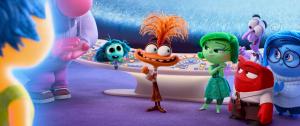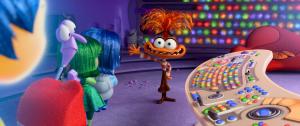Disney Pixar’s Inside Out 2 came through again with all of Riley’s familiar feels: Joy, Anger, Sadness, Fear, and Disgust. A surprising automatic deployment of 13-year-old Riley’s Puberty button introduced new (and remarkably relatable) emotions to headquarters: Anxiety, Embarrassment, Envy, Ennui, with a few cameos by Nostalgia.
Along with the memory creation and storage, which continued from Inside Out, the film showed the formation of Riley’s belief system in a pooling area of Riley’s stream of consciousness. Beliefs like “I am kind” and “I am a good friend” grew along with others like “broccoli is disgusting” and “pizza is the best.” Formative memories created strands of light stretching from the pool to headquarters. These belief strands formed Riley’s core beliefs about how she viewed herself and the world around her.

With anxiety and depression at an all-time high worldwide, I applaud Inside Out 2 for depicting a version of teen anxiety. Riley’s Anxiety resonated with me so much. I have felt my own anxiety’s frenzied whirlwind while trying to protect myself and also have found myself catapulted into subsequent mistakes and frustrations, similar to Riley’s. I’ve also felt a priority paralysis that could prevent me from moving outside of my comfort zone to try something new. Riley’s anxious hypervigilance and overthinking/psychoanalysis are very familiar to me.
Like Riley, I’ve also been able to stifle anxiety’s crushing hold on me by accessing gratitude and joy.

Riley found stasis by acknowledging all aspects of herself. Using that paradoxical conglomeration of self to bring balance is something I wish I’d learned at 13. In a social media construct determined to honor only the perfect and happy, I’ve finally learned that I can feel joy while milling about in the messiness of life.
Somehow Riley found joy in the midst of anxiety’s chaos because of Joy’s persistent nature. Did she really just dig deep and overcome anxiety while responding with really high emotional intelligence?
Inside Out 2: Balancing Anxiety with Joy
Unfortunately for people around me, Riley’s response wasn’t my instinctive or natural reaction to initial encounters with anxiety. And while I don’t expect any Hollywood movie to portray my theological beliefs or the patterns I follow as a response to overloaded emotions, and despite specifics for Riley’s triumph, I could still apply what the film depicted to ways I find stasis.
The most important factor for me? My faith in Jesus Christ is the critical part of digging deep and overcoming anxiety.
I find a sense of balancing joy through my faith in and hope of Jesus Christ. Knowing that God has an eternal plan of happiness for me and everyone else provides a foundation for my life.
Gallup’s Faith & Wellness Study explored “the worldwide connection between spirituality and wellbeing” since
[g]lobally, experiences of negative emotions — such as sadness, worry, stress and anger — are at their highest level in more than a decade of measurement. . . .The ultimate goal in measuring wellbeing is to maximize positive outcomes and minimize negative ones so people can live the best life possible.
The study found that
Spirituality can help develop a sense of purpose and positive coping skills
More U.S. adults turned to religion or spirituality when they were anxious, stressed or in need of comfort than any other source. (CBS News survey, 2020)
One Harvard study showed that people who frequently pray or meditate are 47% more likely to have a sense of mission and purpose in their life than those who do not.
Religion orients people toward a worldview that helps them understand and work through times of suffering.
I definitely rely on the sense of mission and purpose a belief in Jesus Christ provides me.
God as a Collaborator Partner
I’ve thought a lot about recent discussions surrounding religious abuse and get that theological rhetoric used as a means for manipulation, shame, or violence damages a person’s trust in a loving God who isn’t caught up in zero-sum games or who isn’t a puppet master motivated by abject domination.
Along those lines, The Faith & Wellness Study found that
The research on the effects of prayer on mental health is mixed, with some finding prayer is associated with higher anxiety levels and others finding it leads to lessened anxiety.
Negative religious coping (such as believing God is being unfair or has abandoned you in difficult times) was related to worse psychological outcomes.
Those viewing God as a collaboratoror partner have better mental and physical health outcomes than those who are angry at God or who relinquish responsibility to God.
The God I worship is a collaborator partner. This is a core doctrinal belief for members of The Church of Jesus Christ of Latter-day Saints. God the Father provided a path to return to His eternal presence through the infinite atoning grace of His Son Jesus Christ. He instituted commandments to enable an easier traversing of the path to His presence and ordained ordinances and covenants to enable accessing the fullness of Jesus Christ’s grace. With all of that structure in place, I can choose to receive or reject His plan. In other words, I can choose to act in collaboration with God or choose to be acted upon—responding to life’s challenges and relationships as though I’m a puppet or living life without a tether. Because of our right to choose, there must actually be a choice.
In that choice, we can experience joy.
An Empowering Identity
As Riley’s world shifted (her best friends were both going to a different school), her identity imploded. Who was she without those friends? What if she couldn’t find anyone to be her friend?

With an unsecured identity, Anxiety needed to preempt any horrible scenarios that could ruin Riley’s life. She removed Riley’s core belief of “I am a good person” and replaced it with comparative beliefs like “If I act like everyone else, people will like me.” As Riley began to compare herself to others, she felt the need to compete, and Anxiety’s overthinking worry, with a short-sighted zero-sum game mentality, emerged.
Having a healthy identity reduces some of the intensity of generalized anxiety. Understanding we are children of God can help establish a firm identity basis to grow from.
I Am a Child of God
As a child, a favorite church song was “I Am a Child of God.” The song teaches that we have a divine identity. Does knowing that we’re children of God make a difference? If God is a collaborator partner rather than a domineering or absent parent, the words empower while acknowledging that progressing through life involves effort and learning. A lifetime of learning also implies that we make mistakes but do not have to be defined by mistakes.
I am a child of God and he has sent me here . . .
Lead me, guide me, walk beside me, help me find the way
Teach me all that I must do to live with him some day
At Riley’s age, I began reciting a young women theme in church on Sundays that began
We are daughters of our Heavenly Father, who loves us, and we love Him.
Today, teenage girls recite a revised version of that theme. It begins
I am a beloved daughter of heavenly parents, with a divine nature and eternal destiny.
With a healthy view of ourselves as eternal beings, we are not left seeking validation from others. Of course, we still seek friends and are kind to others, but we are not held hostage by friends or the lack of friends.
Immediately as I wrote that, Holocaust survivor Viktor Frankl came to mind. Though imprisoned in Auschwitz at age 37 and suffering indescribable horrors, Viktor’s philosophy was
Between stimulus and response there is a space. In that space is our power to choose our response. In our response lies our growth and freedom.
And
When we are no longer able to change a situation, we are challenged to change ourselves.
Riley learned to live in joy as she acknowledged all aspects of herself despite her failings and weaknesses. She learned that shortcomings provide opportunities to choose: will she acknowledge the shortcoming and adjust or let it persist? In the movie, Riley chooses to adjust, asks for forgiveness from her friends, and forgives herself.

However, it’s not always so obvious or easy to make those adjustments to find balance in real life. How do you do it?
Skylight
For those of us not intuitively able to cope with emotional imbalance and disconnect without some guidance, there are so many wonderful resources available!
For example, Skylight.org provides incredible wellness support on its free app and website. Skylight seeks to blend spirituality with mental and physical well-being, offering everything from meditation, stretching, and yoga practices to music and articles focusing on topics like anxiety, sleep, stress, loneliness, and self-esteem.
Skylight’s musical sound baths are so relaxing. And I’ve enjoyed the quick morning and evening meditations and breathing exercises to ease into or out of my day.
Skylight.org is so interested in the intersection of faith and wellness that they encouraged Patheos authors to watch Inside Out 2 through our unique faith lenses. What a fun challenge! If you watch Inside Out 2, I hope you take that challenge, too. And if you’d like to add emotional wellness support to your routine, check out Skylight.org!












